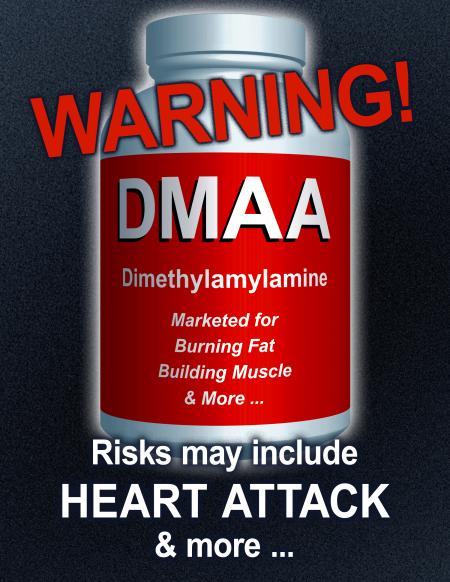DMAA in Products Marketed as Dietary Supplements
August 2018
What is DMAA?
DMAA (1,3-dimethylamylamine) is an amphetamine derivative that has been marketed in sports performance and weight loss products, many of which are sold as dietary supplements. DMAA is not a dietary ingredient, and DMAA-containing products marketed as dietary supplements are illegal and their marketing violates the law.
Also known as methylhexanamine or geranium extract, DMAA is often touted as a “natural” stimulant; however, the FDA is not aware of any reliable science indicating that DMAA exists naturally in plants. Although DMAA at one time was approved as a drug for nasal decongestion, it is no longer approved for this use and no medical use of DMAA is recognized today. DMAA, especially in combination with other stimulant ingredients such as caffeine, can be a health risk to consumers. Taking DMAA can raise blood pressure and lead to cardiovascular problems ranging from shortness of breath and tightening in the chest to heart attack.
The FDA continues to advise consumers not to buy or use products marketed as dietary supplements that contain DMAA due to the health risks they present.
Is it safe to consume DMAA?
The FDA does not have any information to demonstrate that consuming DMAA is safe. When DMAA is added to a product marketed as a dietary supplement, the FDA considers it to be an unsafe food additive. The FDA is very concerned about DMAA, and we advise consumers not to purchase or use any product containing DMAA. This substance narrows blood vessels and arteries, which can raise blood pressure, and may lead to cardiovascular problems such as shortness of breath, arrhythmias, tightening in the chest, and heart attack, as well as seizures and other neurological and psychological conditions.
What is FDA doing to remove DMAA-containing products marketed as dietary supplements from the market?
Over the past several years, the FDA has used different methods to ensure DMAA-containing products are taken off the market. These actions are being taken to protect consumers and get these products off the shelves as quickly as possible.
Starting in 2012, the FDA has issued warning letters to companies notifying them that marketing DMAA-containing products violates the law. When we find products containing DMAA during facility inspections, we discuss our concerns with firms and give them an opportunity to voluntarily recall and destroy these violative products. Most companies warned are no longer distributing products with DMAA.
When firms have chosen not to comply voluntarily, the FDA has taken other actions. In 2013, the FDA administratively detained two DMAA-containing products, OxyElite Pro and Jack3d, after USPLabs initially refused the FDA’s efforts to achieve voluntary compliance. USPLabs ultimately destroyed the detained products – which were estimated to have been worth more than $8 million at the retail level, and agreed to stop manufacturing with DMAA. Also in 2013, the FDA seized DMAA-containing products from Hi-Tech Pharmaceuticals; a federal district court ruled in April 2017 that the products were adulterated and ordered them condemned and forfeited to the United States for destruction. In 2019, the U.S. Court of Appeals for the Eleventh Circuit affirmed the lower court ruling, finding that DMAA is not a dietary ingredient and is not generally recognized as safe, and condemning and forfeiting the seized articles containing DMAA. The Supreme Court denied a request from Hi-Tech Pharmaceuticals to review the case in 2020. The products were destroyed on November 12, 2020.
The FDA continues working to get DMAA products off the market when it identifies them. Consumers should not buy or use any product containing DMAA.
How do consumers know if a product marketed as a dietary supplement contains DMAA?
Consumers should look for DMAA listed on the product label. It may also be listed as:
- 1,3-DMAA
- 1,3-Dimethylamylamine
- 1,3-Dimethylpentylamine
- 2-Amino-4-methylhexane
- 2-Hexanamine, 4-methyl- (9CI)
- 4-Methyl-2-hexanamine
- 4-Methyl-2-hexylamine
- Dimethylamylamine
- Geranamine
- Methylhexanamine
- Methylhexanenamine
Some products will also list Pelargonium graveolens extract or Geranium extract, which may indicate that the product contains DMAA.
What should consumers do if they believe they’ve been harmed by consuming DMAA- containing products marketed as dietary supplements?
Consumers who believe they have been harmed by using a DMAA-containing product should contact their health care practitioner. Consumers can also report such incidents directly to the FDA through the Safety Reporting Portal. In addition, consumers can also report these adverse events to the company whose name and contact information is on the product label.
Warning Letters Issued by FDA
- Exclusive Supplements, Inc 4/24/12
- Fahrenheit Nutrition 4/24/12
- Gaspari Nutrition 4/24/12
- iSatori Global Technologies, LLC 4/24/12
- Muscle Warfare, Inc 4/24/12
- MuscleMeds Performance Technologies 4/24/12
- Nutrex Research, Inc 4/24/12
- SEI Pharmaceuticals, Inc 4/24/12
- SNI LLC 4/24/12
- USP Labs, LLC 4/24/12
- Regeneca, Inc 8/28/12
- Formulife, Inc 6/17/13
- Pure Energy Products, Inc 9/6/13
- YoungYou International, Inc 10/7/14
- Line One Nutrition, Inc 3/31/16
- Naturecom Inc 4/20/17
- Total Body Nutrition 9/28/17 (Includes reference to a voluntary destruction)
- Nexagen, LLC 10/6/17 (Includes reference to a voluntary destruction)
This webpage describes FDA’s views and recent actions with regard to an ingredient used in products marketed as dietary supplements. If you have evidence that calls FDA’s views into question, we invite you to submit it, along with your reasoning, to FDA at ODSP@fda.hhs.gov.
This page is not intended to provide a complete list of all FDA actions and communications with regard to this ingredient and its use in products marketed as dietary supplements.


